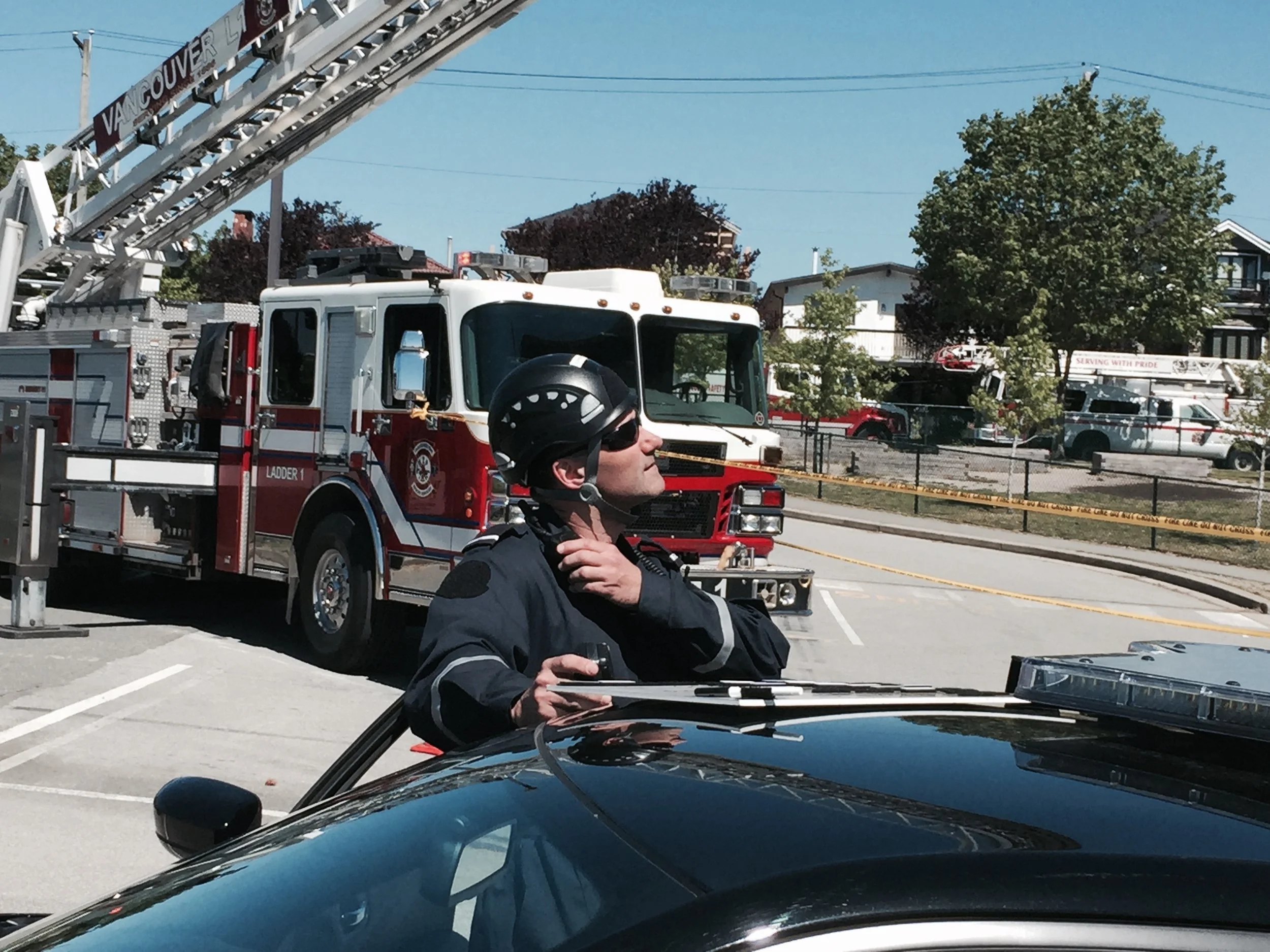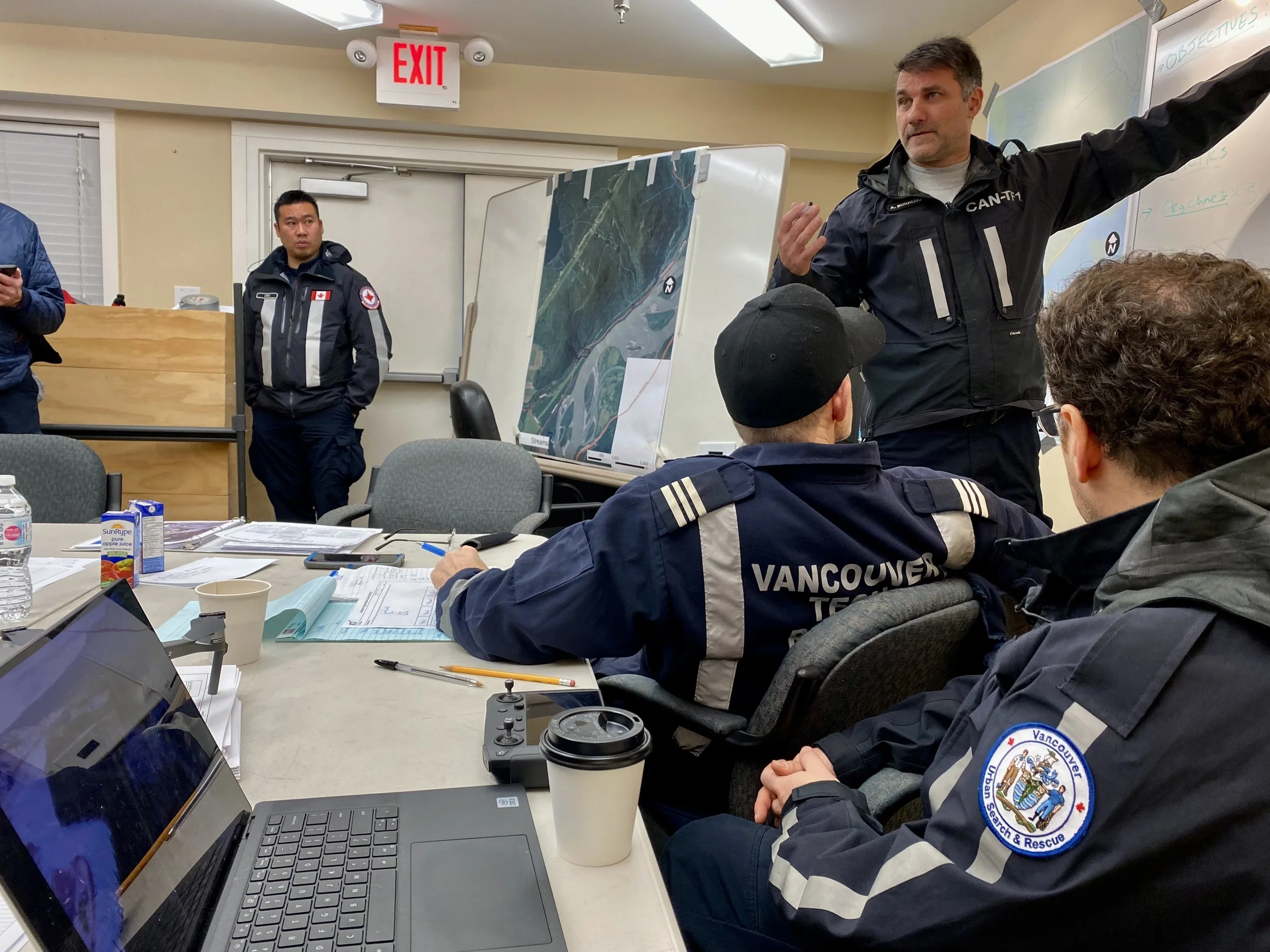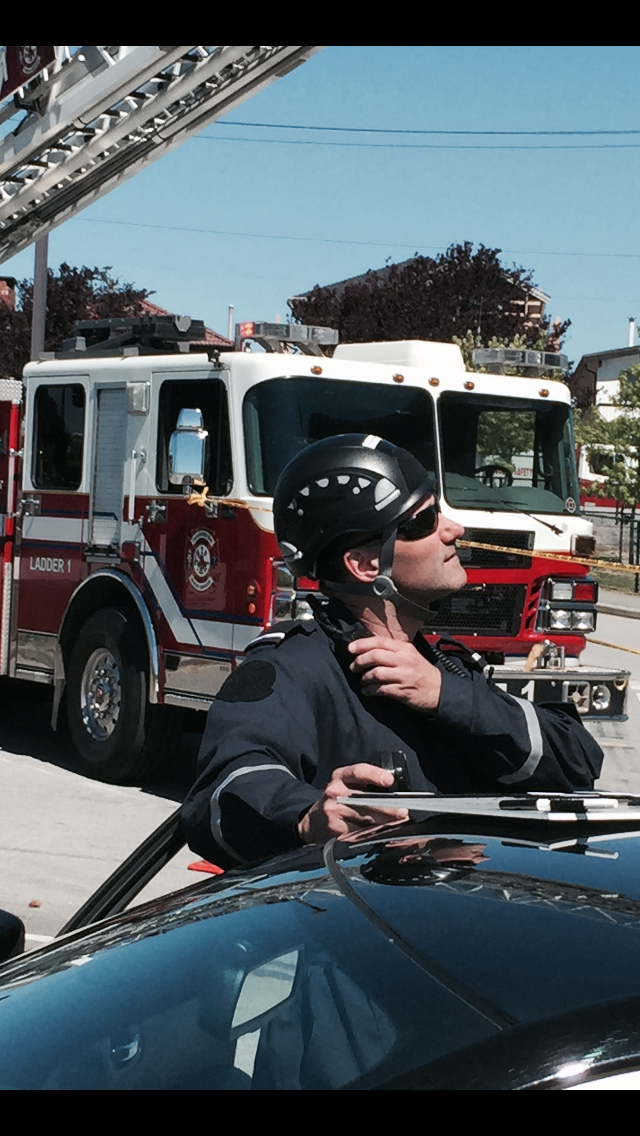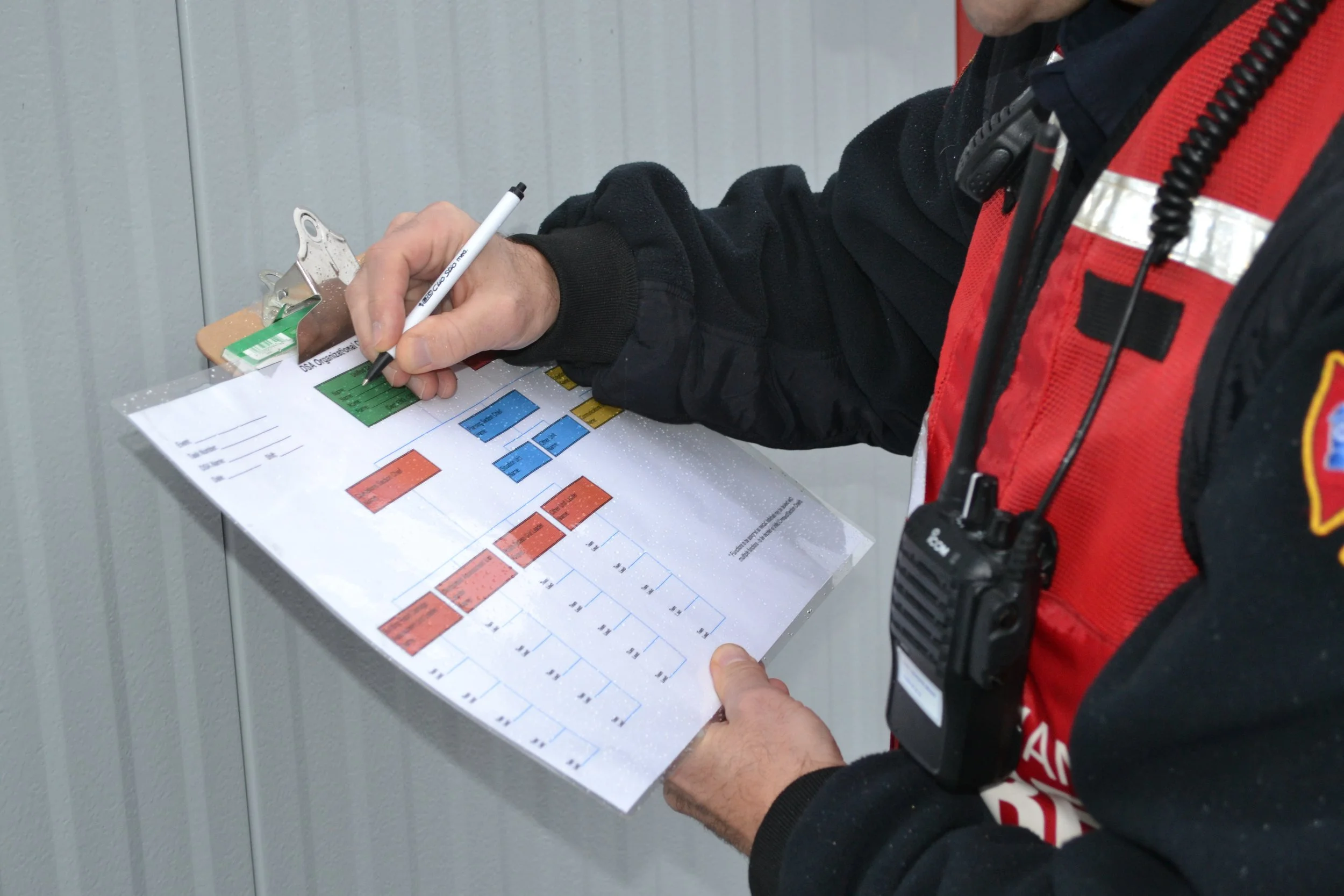
It would be our pleasure to train your personnel.
All of our programs meet and exceed Work Safe and N.F.P.A. standards. All students are expected to pass a written, proficiency and a practical evaluation at each level. We can also provide on going proficiency and yearly recertification training. All our instructors and technicians come with exceptional recommendations and resumes to match.
Incident Command System
-
Introduction to Incident Command System, I-100 introduces the Incident Command System (ICS) and provides the foundation for higher level ICS training. This course describes the history, features and principles, and organizational structure of the Incident Command System.
Learning Outcomes
At the successful completion of this course participants will be able to demonstrate an introductory knowledge of the Incident Command System as described in the following topics and learning outcomes:Purpose of ICS: the requirements and purpose to use ICS and common incident tasks.
Basic Principles and Features of ICS
Incident Commander and Command Staff Functions: roles and functions of the Incident Commander and Command Staff.
General Staff Functions: roles and functions of the Operations, Planning, Logistics and Finance/Administration sections.
Common Responsibilities: common mobilization responsibilities and common responsibilities at an incident, individual accountability responsibilities, and common demobilization responsibilities.
Facilities: basic ICS facilities, their use and location, and facility map symbols.
Prerequisites: There are no prerequisites for I-100.
Target Audience
Typically, agencies and organizations adopting and implementing ICS should require all personnel at the following levels of responsibility in emergency management and incident response operations: first-line supervisor, mid- level management and command and general staff to complete I-100Duration: Minimum of 8 hours for presentation, including breaks.
-
I-200 defines the unique qualities of ICS as an event or incident management system. This course focuses on the management of single resources. I-200 provides training for personnel who are likely to assume a supervisory position within the ICS.
Learning Outcomes
At the successful completion of this course participants will be able to demonstrate basic knowledge of ICS through:Management by objectives and Transfer of Command
Functional Areas and Positions: introduction to the process used to manage an incident, the function of organizational positions, and demonstration of the use of an ICS 201 form.
Briefings: operational briefings and field, staff and section briefings/meetings.
Organizational Flexibility: modular organization expansion and contraction, complexity analysis, five types of incidents, and the importance of preparedness plans and agreements.
Prerequisites: I-100
Target Audience:
Typically, the following applicants would be included: responder level— emergency response providers and disaster workers who are entry level to supervisory level, including emergency medical service personnel, firefighters, medical personnel, police officers, public health personnel, public works/utilities personnel, and other emergency management response personnel.Duration: Minimum of 16 hours for presentation, inclusive of breaks.
-
I-300 defines the unique qualities of ICS as an event or incident management system in an expanding/escalating situation. I-300 is designed to enable personnel to operate efficiently during an incident or event using ICS in supervisory roles on expanding or Type 3 Incidents
Learning Outcomes
At the successful completion of this course participants will be able to demonstrate intermediate knowledge of ICS as described in the following topics and learning outcomes:ICS Fundamentals Review: ICS fundamentals and organization, reporting and working relationships, information flow, and transfer of command.
Unified Command: features, organization and functions in a multi- jurisdictional or multiagency incident. Roles and reporting relationships under a unified command in single and multi- jurisdictional incidents.
Incident Management Operations: methods and tools used to assess incident/event complexity and transferring and assuming incident command. The key principles of incident management operations and additional training on developing incident objectives, strategies, and tactics.
Resource Management: basic principles, steps of resource management and use of appropriate ICS forms.
Planning Process: planning for incidents or events in reference to the major planning steps, such as logistical concerns, cost-benefit analysis, situational understanding, plan development, implementation, and evaluation.
Demobilization, Transfer of Command: planning, impact of agency specific policies, procedures, and agreements, and terminating command
Prerequisites: I-200
Target Audience:
Individuals recommended to take the I-300 course include incident management personnel, including persons serving as incident commander, command staff, section chiefs, division/group supervisors, branch directors, and unit leaders in Planning, Logistics and Finance/Administration, select department heads with multi-agency coordination responsibilities, area managers, emergency managers, and multi-agency coordination centre /ECC managersDuration: 3 days/24 hours for presentation, inclusive of breaks.
-
I-400 is designed to enable personnel to operate efficiently in the advanced application of the Incident Command System (ICS). The course deals with the command and general staff functions during complex incidents, the implementation of the incident management process on a complex incident and the management and coordination process during multiple incidents.
Learning Outcomes
Command and General Staff: unified command functions in a multi- jurisdictional or multiagency, complex incident, major steps involved in the planning process, issues that influence incident complexity and available analysis tools, primary guidelines and responsibilities of the Command and General Staff positions.
Major and/or Complex Incident/Event Management: Deputies and Assistants: primary factors affecting major and/or complex incidents and events, expansion options for incident/event organization.
Area Command: principal advantages of area command, including how, where, and when area command would be established, area command organization and primary functions.
Unified Command: unified command structure and operations.
Organizational Relationships: organizational relationships among area command, unified command, multi-entity coordination systems, and emergency operation centres/emergency coordination centres.
Prerequisites
I-300Target Audience
Typically, personnel serving as Command and General Staff in an ICS organization, select department heads with multi-agency coordination responsibilities, area managers, emergency managers, and multi-agency coordination centre /emergency operations centre managers.Duration: 16 hours for presentation inclusive of breaks. More time will be required if agency specific material is added. The course is interactive. It has several exercises designed to facilitate group and class discussion.
-
I-402 introduces the Incident Command System (ICS) and provides the foundation for executive understanding and participation in the ICS. This presentation provides a basic understanding of ICS, unified and area command, and multi- agency coordination to those persons responsible for establishing or implementing policy, but who normally are not a part of the on-scene ICS organization. The presentation also discusses responsibilities and information transfer between Executives and Incident Commanders. The target audience includes executives, administrators, and policy makers involved with emergency planning and response or recovery efforts.
Learning Outcomes
At the successful completion of this presentation participants will be able to demonstrate a basic knowledge of the Incident Command System to endorse and support site operations from an executive or administrative view.
Prerequisites
There are no prerequisites for the I-402.
Target Audience
Typically, required personnel include executives, administrators and policy makers.Duration: Approximately four hours. The course is intended to be delivered in a lecture format presented by an ICS Canada Instructor.
ICS Roles
-
Learning Outcomes
This course is designed to meet the training needs of the Incident Commander Type 3 (ICT3). The focus is on the lessons of leadership and command as they relate to the ICT3 position. It is presented in participative lecture format with multiple tactical decision games for students to practice new knowledge.
Course Objectives
1. Demonstrate an understanding of the concept of Command as it relates to the ICT3.
2. Demonstrate effective foundation skills (leadership, risk management, and
communications) at the ICT3 level.
3. Develop situational awareness of incident environment.
4. Demonstrate effective command and control over a quickly assembled team in a time
constrained and rapidly changing incident environment.
5. Demonstrate the ability to manage an incident.
6. Conduct post-fire activities.
Prerequisites
Qualified as Incident Commander Type 4 (ICT4)
Task Force Leader (TFLD)
OR
Qualified as ICT4 and Strike Team Leader
Any two Single Resource Leader positions (one must be Crew CRWB or Engine ENGB)
Pre-Course Work
https://onlinetraining.nwcg.gov/node/201
Target Audience
Personnel desiring to be qualified as Incident Commander Type 3 (ICT3).
Duration: 16 hours
For more information please read through the full course description (PDF)
-
Learning Outcomes
This course is designed to provide the skills and knowledge needed to perform in the position of Strike Team/Task Force Leader. Topics include position overview; pre- deployment responsibilities; concept of the position; resource typing standards; pre- dispatch preparation; incident responsibilities; administration; supervision; response; assignment; demobilization; tactics and safety; risk management; entrapment avoidance; Wildland Urban Interface;case studies; scenarios; appropriate action vs. freelancing.
Prerequisites
ICS-200: Incident Command System (Basic)
CICCS qualified Engine Boss or Crew Boss
-
Learning Outcomes
This course teaches the student the management skills necessary to fill the position of Division/Group Supervisor within the framework of ICS. It teaches only basic tactics or strategy and refers to these only to enhance the particular management technique associated with them.
Prerequisites
ICS-300, AR or AH-330 Strike Team Leader
-
Learning Outcomes
This course presents the command, management, and supervision concepts necessary to function as an Operations Section Chief. Topics include command principles, organization of the operations section, briefings, developing the operations portion of the incident action plan, and supervising operations.Prerequisites
I-400
Target Audience
Individuals qualifying within the ICS as an Operations Section Chief.Duration: 40 hours
For more information please read through the full course description (PDF)
-
Learning Outcomes
This course provides an overview of Unit Leader responsibilities, the Planning Section, and the planning process to contextualize the Resources Leader functions and responsibilities including resource tracking systems, operational planning, and resource products/outputs. The Status/Check- in and Demobilization functions are covered to provide participants with the knowledge to perform those duties if necessary.Prerequisites
IS-0100 Introduction to the Incident Command System, ICS 100
IS-0200 Basic Incident Command System for Initial Response, ICS 200
E/L/G 0300 Intermediate Incident Command System for Expanding Incidents, ICS 300
IS-0700 An Introduction to the National Incident Management System
IS-0800 National Response Framework (NRF), An Introduction
Target Audience
The intended audience(s) are local- or provincial-level emergency responders who may be designated as Resources Unit and/or Demobilization Unit Leaders on their local or State Incident Management Team.Duration: 24 hours
For more information please read through the full course description (PDF)
-
Learning Outcomes
This course helps participants establish the essential core competencies required for performing the duties of the Situation Unit Leader (SITL) in an all-hazards incident. This course addresses all responsibilities appropriate to an SITL operating in a local- or state-level All-Hazards Incident Management Team (AHIMT). These responsibilities include processing information and intelligence and developing displays. The course is an instructor-led training that supports learning through discussion, lecture, and active participation in multiple exercises. By requiring participants to bring an SITL Kit to the instruction, the course provides a realistic, hands-on approach to mastering the skills of an SITL.Prerequisites
IS-0100 An Introduction to the Incident Command SystemICS 100
IS- 0200 Basic Incident Command System for Initial Response, ICS 200
E/L/G 0300 Intermediate Incident Command System for Expanding Incidents, ICS 300
IS-0700 An Introduction to the National Incident Management System
IS-0800 National Response Framework (NRF), An Introduction.
Target Audience
The intended audience(s) are federal, state, tribal, and/or local level emergency responders who may be designated as SITLs on their local or state Incident Management Team.Duration: 40 hours
For more information please read through the full course description (PDF)
-
Learning Outcomes
This course is designed to meet a portion of the training needs of the Planning Section Chief Type 2 (PSC2). Topics include information gathering, strategies, meetings and briefings, Incident Action Plan (IAP), interactions, forms, documents, supplies, demobilization, and an optional technology section. In the final exercise, students observe a simulated planning meeting and use the information derived to find errors in an IAP. Students must pass the unit tests and the final exercise to successfully complete the course.Prerequisites
Qualified as any of the following:
Resources Unit Leader (RESL)
Situation Unit Leader (SITL)
Planning Section Chief Type 3 (PSC3)
Operations Section Chief Type 2 (OSC2)
Safety Officer Type 2 (SOF2), or Logistics Section Chief Type 2 (LSC2)
Target Audience
The student will display the skills, knowledge, and tools necessary to perform the duties and responsibilities of the Planning Section Chief Type 2 (PSC2).Duration: 40 hours
For more information please read through the full course description (PDF)
-
Learning Outcomes
The goal of this professional development course is to provide local and state-level emergency responders with an overview of key duties and responsibilities of an Incident Commander within the ICS structure and specifically for a Type III All-Hazards Incident Management Team (AHIMT).Prerequisites
IS-0100 Introduction to the Incident Command System, ICS 100
IS-0200 Basic Incident Command System for Initial Response, ICS 200
E/L/G 0300 Intermediate Incident Command System for Expanding Incidents, ICS 300
E/L/G 0400 Advanced Incident Command System for Complex Incidents, ICS 400
IS-0700 An Introduction to the National Incident Management System
IS-0800 National Response Framework (NRF), An Introduction
Target Audience
The audience may include students from a variety of agencies and functional disciplines, including fire service, law enforcement, emergency management, public works departments, as well as public health organizations, medical emergency teams and hospitals.Duration: 40 hours
For more information please read through the full course description (PDF)
Further Training
-
Train the Trainer Awareness Level is designed to prepare course participants become future ICS Instructor to deliver ICS Canada I-100 and I- 200 curricula.
Learning Outcomes
At the successful completion of this course participants will be able to demonstrate an understanding of how to deliver the I-100 and I-200 as a Unit Instructor in a classroom setting. Course participants may then make application to the responsible AHJ for recognition as an ICS Canada Instructor. ICS training materials will not be provided to course participants until they are recognized as an Instructor.Prerequisites
Successful completion of recognized I-100 and I-200 courses.
Service in a mid-level emergency management and incident response position (“leader” level or higher) within five years in operational incidents, planned events, or exercises OR have specialized knowledge and experience appropriate for the audience.
Recognized qualifications in techniques of instruction and adult education methodologies.
Testing and Evaluations Procedures
There is no formal final exam; the instructor delivering the course will assess understanding of the concepts by course participants through group discussions and team activities.Target Audience
Agencies are responsible to determine who within their organization will deliver ICS training.Duration: Minimum of 16 hours for presentation, inclusive of breaks. The course is interactive and provides an opportunity for course participants to deliver portions of material and facilitate a learning exercise.
-
Train the Trainer Advanced Level is designed to prepare course participants become ICS Canadian Instructor to deliver ICS Canada I-300 and I-400 curricula.
Learning Outcomes
At the successful completion of this course, participants will be able to demonstrate an understanding of how to deliver the I-300 and I-400 as an Instructor facilitator in a classroom setting. Course participants may then make application to the responsible AHJ for recognition as an ICS Canada Instructor. ICS training materials will not be provided to course participants until they are recognized as Instructor.Prerequisites
Successful completion of recognized I-300 and I-400 courses.
Service as Incident Commander or in a command or general staff position in an incident that required multi-agency coordination and went beyond one operational period or required a written Incident Action Plan (IAP) within the previous five years.
Recognized qualifications in techniques of instruction and adult education methodologies.
Testing and Evaluations Procedures
There is a formal written final exam; the instructor delivering the course will also assess understanding of the concepts by course participants through group discussions and team activities.Target Audience
Agencies are responsible to determine who within their organization will deliver ICS training.Duration: Minimum of 16 hours for presentation, inclusive of breaks. The course is interactive and provides an opportunity for course participants to participate in a variety of group and team-teaching exercises.
-
Learning Outcomes
This course provides an awareness level of knowledge, skills and abilities for those who are responsible for the command and control of technical search and rescue emergencies, including rope, confined space, trench and excavation, structural collapse and technical water search and rescue.Prerequisites
Intermediate Incident Command System for Expanding Incidents, ICS 300
Target Audience
Incident CommandersDuration: 40 hours
For more information please read through the full course description (PDF)
-
Wildland Urban Interface
This 40-hour Course is designed for Supervisors, Engine Company Officers and firefighters, Hand Crew Leaders, and their crew members and any other emergency responders who may respond to a grass, brush or forest fire in the Wildland Urban Interface (WUI).
Learning Outcomes
Upon conclusion of this course, participants will understand and demonstrate strategies and tactics required to safely operate in the Wildland Urban Interface (WUI) including entrapment avoidance, safety, structural defense terminology, structural defense strategies and tactics, incident organization, logistical support, stakeholder interactions and evacuations/repopulation considerations for structures and critical infrastructure.Participants will be given an opportunity to practice structural defense tactics and perform structural triage using their own fire engines, equipment and personal protective equipment in conditions representative of WUI hazards in their initial attack response area and develop an ICS Organization appropriate to the incident.
Testing and Evaluations Procedures
There is a formal written final exam; the instructor delivering the course will also assess understanding of the concepts by course participants through group discussions and team activities.Duration: 5 days/40 hours
For more information please read through the full course description (PDF)
-
Learning Outcomes
Upon conclusion of this workshop, participants will learn tactics and strategies to safely operate in the Wildland Urban Interface (WUI) including entrapment avoidance, safety, structural defense terminology, structural defense tactics and strategies, and evacuations considerations.Participants will be given an opportunity to practice several structural defense tactics and structural triage using their own fire engines, hoses and personal protective equipment in conditions representative of their WUI hazards in their initial attack response area.
Duration: 8 hours
For more information please read through the full course description (PDF)
Got questions?
We’ve got answers.
Whether you want to book a course or ask how we can benefit your team, we’re always happy to talk.



